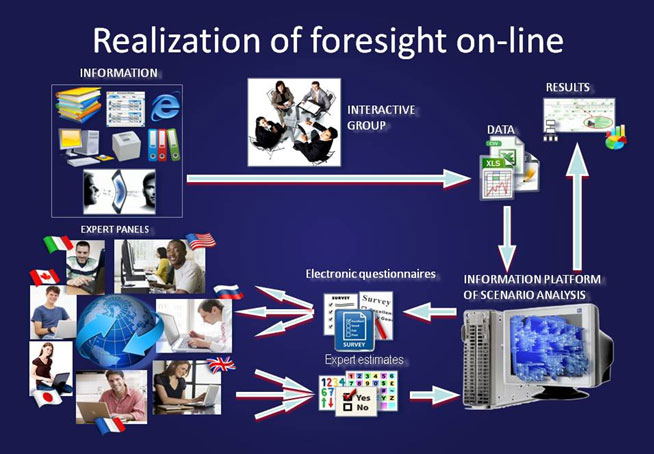Development of the information-expert foresight system with extended analytics of unstructured data
A methodological and methodical toolkit of information-expert foresight system for processing unstructured information was developed, which includes the development of approaches to the analysis of unstructured data for the foresight platform and development of methods for determining the semantic coloring for pieces of unstructured information. The information-expert system is based on mathematical and methodological base for solving scenario analysis problems in social, economic and ecological processes, including the following methods: Analytic Hierarchy Process with fuzzy expert estimates and partial expert assessments; SWOT-method – to determine environmental characteristics and "inner" characteristics of the system over time; cross-impact method – to determine the relationships between elements of each cluster, inter-cluster network and between networks; scanning techniques and brainstorming – to formulate the cluster networks and the cluster members, the decision-making stakeholder groups, their objectives, policies, expert groups, alternative courses of action for the network users, costs and risks; morphological analysis method – for modeling and assessment of all possible alternative options for network users, the policies of decision makers under multifactor risk; factor analysis techniques – to formulate the important elements of the problem, weed out part of the results obtained by scanning, brainstorming and/or morphological analysis method.
A specific issue of creating information-expert system is the supplying and processing of actual initial data, both structured and unstructured. Processing of unstructured data makes it possible to obtain critical foresight data, previously inaccessible in a structured form.
Application of the information-expert foresight system enables timely, adequate, well-informed decisions both at the national or regional level and at the level of individual industries, large organizations and companies, through the use of facts, relationships, values received by both traditional expert assessment, and by analyzing a large body of text documents; the possibility of long-term foresight of complex systems of different nature by combining the methodologies of system analysis and technology foresight with methods of handling large volumes of unstructured information.

| Attachment | Size |
|---|---|
| 517.16 KB |




